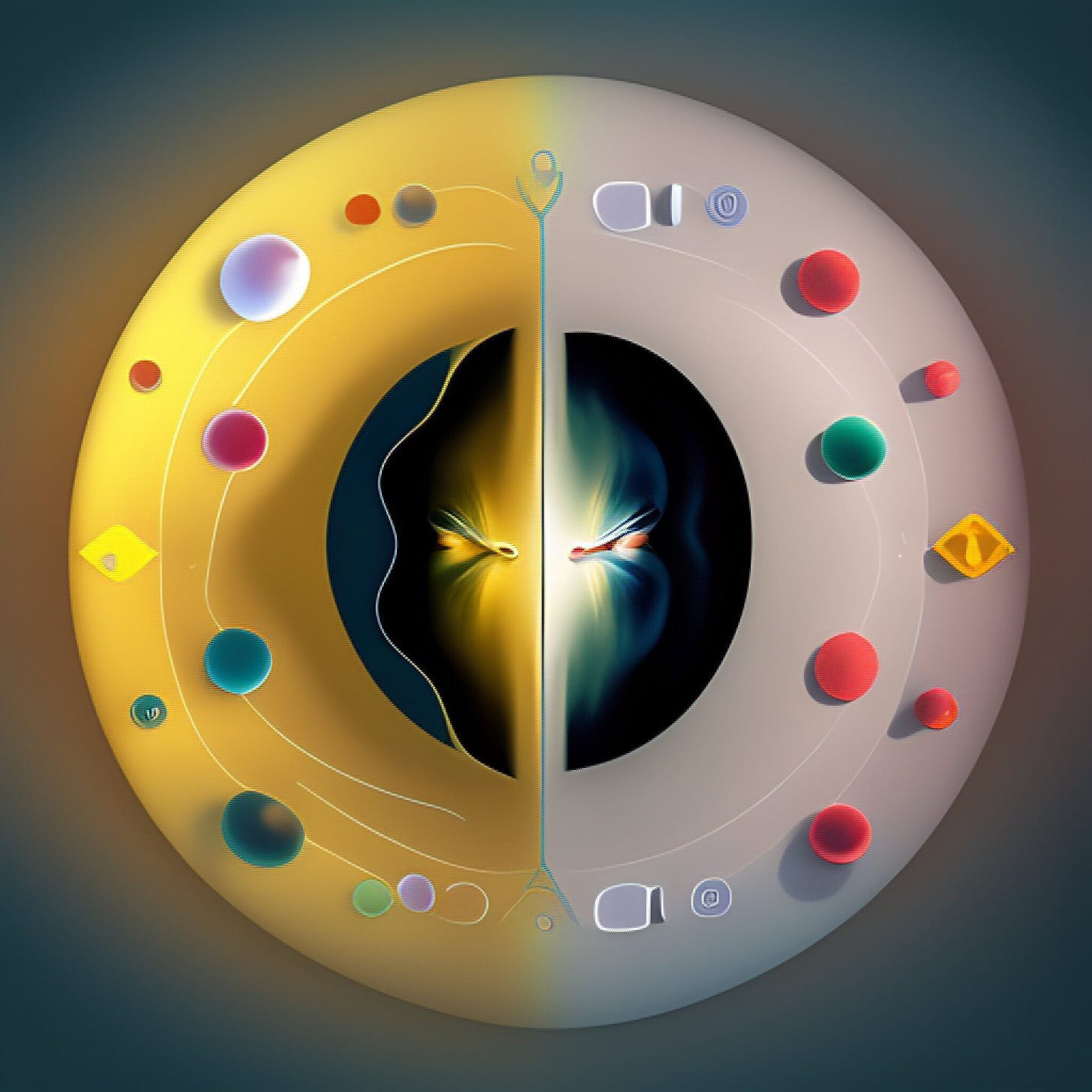Art and Mental Health Interview with Martin Greenwald, M.D. of Socratic Psychiatrist
What is the role of art for patients hospitalized with severe mental illness? What, if anything, is the relationship between creativity and mental health? One psychiatrist's perspective ...
Thank you for being here at Create Me Free. Don’t miss any articles:

I am thrilled to have an interview today with
, author of the Socratic Psychiatrist here on Substack. Martin is also generously sharing a guest post from me today over there as part of The Artist’s Mind book tour so once you’ve had a chance to get to know him through this interview, head on over to check out that post!Here at Create Me Free, I share all of my deep research into and musings about the complex relationship between art and mental health. While I touch on art as therapy and the benefits of creativity, I really dig into the ways that our mental health symptoms can impact our creative process, content, productivity, medium choice, self-perception, and reception by others. There’s not a lot of writing about this side of the coin and Martin adds a great voice to this through this interview.
Martin is a psychiatrist practicing in the midwest United States working mostly with patients who are psychiatrically hospitalized while also maintaining a small psychotherapy practice. His Substack is where he shares his personal thoughts and opinions on a wide range of topics including examples of art in the work that he does. Let’s learn more …
What led you into the field of psychiatry?
Psychiatry seems to run in both sides of my family. I was exposed early—my mother is a psychiatrist and when I was a young child, she worked on the grounds of a large state psychiatric hospital that was built as an asylum in the 19th century. It was an enormous, multi-building campus, and I remember walking around the grounds meeting some of the patients who were long-term residents. I’m not sure if it was those early experiences or just my natural temperament, but I’ve never felt uneasy around the severely mentally ill as some people do.
The shelves at home were overflowing with books, with a good number on psychotherapy and related topics. When I was a teenager, I started getting into Freud and other psychoanalysts, especially Karen Horney and Erich Fromm. I think it was around that time I started reading a lot of the existential psychotherapists like Irvin Yalom and Rollo May as well. I was also starting to read a lot of philosophy as a teenager, and I found my philosophical interests—the nature of consciousness, free-will, identity and selfhood, and so on—intersecting with my budding psychological and psychiatric interests.
I think I knew I was going to apply to medical school by the end of my first year of college, and I knew I was applying to become a psychiatrist. I was interested in philosophy more than ever, but I realized very quickly that making a living as a philosopher is no easier now than it was in the past, and I looked for other ways to satisfy my curiosity about human nature without committing myself to a life of poverty. I considered psychology, but I’m not a researcher at heart so most psychology PhD programs were out of the question. Medical school and psychiatry seemed like a logical choice.
In medical school I explored other specialties to make sure I wasn’t being too narrow-minded in my interests, but nothing kept my interest like psychiatry did. So far, I haven’t regretted my decision!
It’s wonderful that you seemed to know early on what the right path for you was. What, if anything, would you like to share about your own mental health journey?
I have been very fortunate insofar as I’ve never suffered from serious mental illness. I’ve never felt like I truly needed any psychiatric medications either, although I’ve tried some along the way, mostly out of curiosity.
My longest experience as a patient was when I was at the Chicago Psychoanalytic Institute and was in a training psychoanalysis where I was on the couch four days a week. That analysis wasn’t complete, however, since I decided psychoanalytic training wasn’t right for me at that time and left the institute.
I have always been fascinated by that type of psychoanalysis, which doesn’t seem to be commonly used in the US anymore but was a key part of the mental health history of many famous artists and writers. (Louise Bourgeois is just one example.)
What aspect of psychiatry interests you most right now?
There is so much to pick from it’s hard to stay interested in just one thing for long.
Like a lot of people, I’m interested to see what impact psychedelics like psilocybin have in the next few years. I’ve done a reasonable amount of my own research and from what I’ve seen, I’m hopeful they will expand what we think is possible in treatment, especially psychotherapy. One of the big questions I’m wondering about is to what extent psychedelics will help people with severe mental illness, especially severe depression, anxieties, or addictions, or will most of its usefulness be for those who are often described as “higher functioning”.
I also worry that false hope and enthusiasm will blind us to their limitations, as often happens with new developments in the field. That said, it is all very exciting stuff and there is reason for hope given their long history of use prior to being adopted by the psychiatric field.
Those are great questions for us all to consider. I’ve seen some instances among people I know who have been living with treatment-resistant depression and are now doing well on ketamine. But every person is going to be different, and we don’t know what the long-term situation will be. Still, as you said, it’s hopeful.
How would you personally define "mental health"?
This can actually be a somewhat controversial question for some people. Once you start talking about health, you’re talking about function, and the fact that our organs and bodies as a whole can fulfill their functions to a better or worse degree. But with mental health, once we start talking about function, some people worry that we’re going to start inserting certain contingent values into medicine, or that this leads us down a road that is overly-normative and prescriptive.
That said, here’s my best shot, starting with illness and working up to health: there is no one ideal of mental health just as there is no one ideal of physical health. After all, it is very possible that different cognitive traits, personality types, temperaments, etc may be more or less adaptive in various contexts. But that doesn’t mean everything is subjective or socially constructed, either. Our brains/minds, just like the rest of our bodies, have certain capacities and functions we need for survival (recognizing and remembering others, coordinating movement, planning ahead, spotting predators and prey, etc). Many of these capacities are working in one way or another to maintain an organism's physical or psychological homeostasis, and can respond to stresses and insults in order to bring the organism back into balance. Sometimes these capacities become impaired in severe ways, threatening the organism’s survival and, just like a broken leg or congested heart, require intervention.
Consider a delusion, in which the brain’s ability to update its beliefs based on new information is compromised. Or the phenomenon of thought insertion, in which someone experiencing psychosis feels as if some of the thoughts they are having are not “theirs”, but that they have been put there by some external agent. This is dysfunction and illness.
What about health? A basic element of mental health is the proper functioning of our cognitive faculties, but this is a low bar. I think the proof of mental health, like physical health, is in the pudding. What do we expect and hope mentally healthy people to do? Here are a few things that come to mind:
The ability to form durable, cooperative, trusting relationships with others
Stability of mood or “affect tolerance”. How much can you deal with your own and other peoples’ emotions without losing control?
Having a sense of agency and the ability to make choices for oneself
A stable sense of personhood, or psychological continuity, in which you can understand your life in a comprehensible way and integrate the good and bad parts of yourself into a coherent whole.
Feeling needed, useful, and productive.
A sense of self-worth (and other-worth)
Ultimately, although it sounds dangerously close to Eat, Pray, Love, or something you’d see on a Hallmark card, I think if someone has the ability to work, play, and love, then they’re probably doing pretty well.
I happen to love Eat, Pray, Love :) I tend to think we all exist on a mental health spectrum which sounds a little bit like what you’re saying - that there’s optimal health and severely-impairing illness and a lot in between.
What is your general perspective on the relationship between art/creativity and mental health?
In general I try not to romanticize mental illness, and my instinct is that there is not as strong a connection between mental illness and creativity as some people think. But that’s just my sense of things. What I have seen, however, is how helpful making art can be for those suffering from mental illness, and I have little doubt that it can be an important part of treatment for many people, especially those who may not think they have it in them to create something. Being productive is an absolutely essential part of mental health, perhaps the most overlooked of our era, and making art is such an easy way to start.
You have shared that you ask your clients about the art that they create ... what inspired you to begin doing that? How does that change the therapeutic relationship? What are some of the interesting things you've been able to learn about them through these conversations?
I can’t remember exactly when I first became interested in this, but it was sometime in medical school. I probably saw a drawing a patient made and just asked them about it, but I don’t recall the first time.
So far I’ve found it only helps the therapeutic relationship, although I don’t ask every patient for their art either. For starters, this is something I do much more often with hospitalized patients for the simple reason that they have time to do things like make art and show it to me. Typically I only ask them if they first tell me or show me they have some interest in art, instead of soliciting them out of the blue. Often they may be writing something, and if they want to share it I’ve been given writing samples as well. I tend to approach the whole thing pretty casually, so as not to put any pressure on them or make them feel like it’s required. And I never ask a patient in psychotherapy for art since that isn’t what therapy is about and would introduce all kinds of transactional problems.
Many patients (just like many people in general) can use art as a starting point to talk about things that are disturbing, frightening, or just far outside the realm of what they usually talk about. I’ve learned a lot of interesting backstories, fantasies of alternate lives not lived, and dreams for the future. And, people are sometimes more willing to tell secrets through art than through words.
That makes sense. I would say it’s not just that they’re more willing to tell secrets through art, which is true, but also that sometimes that’s the first way that they can access secret or deeper thoughts. Annie Rogers’ books A Shining Affliction and The Unsayable come to mind.
I'm familiar with the clock drawing exercise that you shared in one of your posts. Are there any other exercises that you utilize regularly that relate to drawing/art?
The clock-drawing test is one of three drawing tasks on the Montreal Cognitive Assessment (MOCA), a common screening tool for cognitive impairment. The other two are copying a cube and the trail making test-B. Between those three, you can pick up a lot of problems that most kinds of drawing tests would reveal (or at least ones that are useful in day-to-day clinical work).
The other task I regularly ask of patients is to write a sentence. Some conditions can cause alterations in handwriting, such as micrographia seen in Parkinson’s disease. Medications can also cause side effects such as tremor, which can impact writing. It can also be a good test of literacy and education, if you don’t ask your patient to read you something.
That’s something that I’m only beginning to learn about myself and have started to become really intrigued by. I know you wrote about it a bit here. Anything more you can add about that?
This is something I’ve been looking at recently actually, although I don’t think I’ve found anything terribly interesting yet. A lot of the work on handwriting involves complex analysis that isn’t yet clinically practicable, and I haven’t found any reliable tests like “If your handwriting changes in this or that way, then you’ve got methamphetamine-induced psychosis!”. It is used more often in dementia and other neurology work, but that is something I don’t do day-to-day.
Obviously without sharing names or identifying details, do you have any stories to share of clients who stand out in terms of how art is therapeutic? How about how mental health symptoms impact/alter/inhibit art for someone?
For the therapeutic value of art, the piece I wrote about “Luciana” is probably the case that stands out most in my mind right now.
That’s a great piece. I loved the lines from it:
“That’s another great thing about making art, you know, you don’t think about yourself as much when you’re doing it. Or at least I don’t. I just feel, I don’t know, peaceful, lighter.”
The sad truth is that, at least in my experience, the relationship between mental illness and art is much more often one of frustration and inhibition than inspiration. Most of my patients who are artists or have artistic inclinations find their efforts at creation hampered or totally destroyed by psychological difficulties or outright mental illness. I’ve had a number of psychotherapy patients who were artists or academics whose output has ground to a halt because of depression, crippling anxiety, or other problems that don’t fit neatly into our diagnostic categories
Absolutely. That’s the part of the conversation that I think has been missing for a long time (forever?) in regards to art and mental health. In my own research, I’ve found a lot written about the therapeutic or cathartic value of art but much less shared about the way that mental health symptoms impact artists. I’ve found that even when the mental health challenges are not severe and debilitating, they can still impact creative process, content, medium, productivity and art as business. My own work is in trying to help artists understand the impact for them individually as they work to achieve creative and financial success while maintaining holistic wellness. But it’s obviously a very complex topic.
Who are some of the artists you personally enjoy? Any writers, musicians, mental health professionals you want to add to that list?
For painting, my favorites are Caravaggio, Jusepe de Ribera, and Rembrandt.
Music, now that’s a big topic for me and dear to my heart. When I was younger I taught music professionally and I continue to listen widely. Here is a sampling of some of my current favorites I have on rotation:
Giiovanni de Paestrina, Sicut Cervus. This is my candidate for the most beautiful song ever composed.
American Minor, Buffalo Creek. A mid-2000’s southern rock band that unfortunately didn’t make it but really deserved to. This song recounts the Buffalo creek disaster.
Ben Rector, Living My Best Life, a cool song about the joys a marriage and fatherhood
Vulfpeck, Animal Spirits, my daughter’s favorite song
My favorite all-around writer is probably Michel de Montaigne, and he’s a first-rate psychologist to boot. Cervantes’ Don Quixote is always delightful, and I think in our quixotic time we can find a lot to relate to in the protagonist and his quest. I have a long and ambivalent relationship with Stoicism, but I’d recommend Seneca to anyone. Adam Smith’s Theory of Moral Sentiments is a sadly underrecognized book on human nature. I could go on and on about the classics, especially fiction, which we don’t read enough of. I think the most recent fiction I finished was The Three-Body Problem, which was fantastic.
As for authors who are mental health professionals, I’d say Irvin Yalom is at the top of the list of living authors. He’s written novels dealing with the philosophies of Spinoza, Nietzsche, and Schopenhauer, while also finding time to write the definitive books on group psychotherapy and existential psychotherapy. For those interested in contemporary psychodynamic psychotherapy, Nancy McWilliams is an excellent resource. She is remarkably clear and jargon-free, and I think her writing is accessible to the interested layman. Her book Psychoanalytic Diagnosis has probably taught me more about working with personality disorders and psychological defenses than any other.
The other recommendation I’d give is to read Freud. Regardless of his errors and controversial legacy, he was a truly gifted writer, and it shows even through translation into English (there is supposed to be a major re-translation of Freud’s complete works coming out any day now). I think Civilization and its Discontents is a good place to start for someone without much exposure to his works, but that may be because it’s the first of his books that I read.
Such a great list of resources for us to check out! I found Freud hard at first for all of the reasons that women in the 21st century might find him challenging, but I agree that learning him is foundational to understanding mental health history, plus he has some important theories and I don’t believe in throwing out the baby with the bathwater so to speak. What turned it around for me was reading Basic Freud by Michael D. Kahn which gave me perspective and understanding so that I could then read Freud with an open mind. So, thank you for adding that.
Having shared all that you have here, what is something that we might be surprised to learn about you?
My nickname in medical school was “Party Marty”. I was called that so often, even in class, I had to correct some of my professors who thought my name was actually Marty.
Ha! That’s great! Well thanks for joining us for the party here and for sharing my guest post over on Socratic Psychiatrist as part of The Artist’s Mind virtual book tour! I hope everyone will head over there now to check it out alongside some of your other great writing there.
PLEASE HELP ME MEET MY GOAL:
My goal is to find 1000 people who are interested in subscribing to this work at a rate of $100 per year. This shows the world that we as creatives believe artists and writers can and should earn six figures. I practice artistic tithing, meaning that at least 10% of my income automatically goes to support other artists, writers, makers, creatives, performers, etc. So if I meet my goal, we keep at least $10000 of that right in the creative community.
$100 per year feels like a lot. But it works out to less than $2 per week.
If this is something that you believe in, I really need the support of paid subscriptions to be able to keep doing this work that I’m deeply committed to. See benefits for paid subscribers here. On a really tight budget? Learn about my Pay What You Can option here.











Fascinating insight, plenty of food for thought! I particularly valued the nuanced, thoughtful and open-mindedness of Martin's answers.
Irvin Yalom is one of my favourite writer, and I look forward to discovering more writers and thinkers through your recommendations, thank you!
Love this!